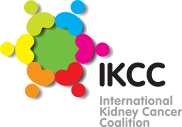The following Draft Position Statement on Unmet Patient Needs has been developed based upon feedback from patient organisations representing over 1.2 million kidney cancer patients/carers across the globe. Each statement is derived from extensive patient surveys and publications of patient-generated data by the IKCC and Affiliate/Partner organisations worldwide along with scientific publications outlining the limitations of existing therapies.
Unmet Needs for Patients with aRCC (All)
- Treatments that meet patient and carer priority goals of cure/durable remission, disease stability, and long-term duration of response. [1]
- Treatments with improved tolerability, measured with improved disease-specific quality of life (QoL) instruments and patient-report outcomes (PROs) included in all clinical trials to enable informed decision making. [2]
- New options including new mechanisms of disease control, including novel agents beyond existing VEGF-TKI agents and checkpoint inhibitors. [3]
- Biomarkers to reliably guide patients in their treatment selection. [4]
- Clinical trials in heavily pretreated patients (3rd line and beyond) to provide access to agents that may offer continued disease control with acceptable tolerability/quality of life.
- Improved shared decision making/informed decision making to ensure discussion of all multi-disciplinary treatment options including surgery, radiation, ablation, and palliative care.
- Evidence and guidance supporting best sequencing strategies, including post-adjuvant therapy.
- Increased access to genetic screening for hereditary syndromes per guidelines. [5]
- Reduced barriers to quality care, including reduced financial toxicity globally. [6]
- Increased research to meet the needs of underserved populations and populations with higher incidence of RCC. [7]
- Improved psychosocial support for patients and their carers. [8]
- Survivorship care plans to manage surveillance strategies, late-term effects, and quality of life. [9]
Unmet Needs for Patients with Rare Variant RCCs
- Clinical trials for specific rare variant RCCs with goal of evidence-based treatment guidelines for specific variants. [10]
- Access to therapies for rare variant RCCs, many of which qualify as rare cancers. [11]
References:
[1] Battle D, Vaishampayan UN, Msaouel P, et al. Patient priorities and expectations of systemic therapy in metastatic renal cell carcinoma. JCO 41(16), 4560 (2023). DOI:10.1200/JCO.2023.41.16_suppl.4560. [2] Bergerot CD, Malhotra J, Bergerot P, et al. Patients’ perceptions regarding the relevance of items contained in the functional assessment of cancer therapy kidney symptom index-19. Oncologist 28(6), 494-500 (2023). DOI:10.1093/oncolo/oyad028. [3] Pontes O, Oliveira-Pinto S, Baltazar F, et al. Renal cell carcinoma therapy: Current and new drug candidates. Drug Discovery Today 27(1), 304-314 (2022). DOI: 10.1016/j.drudis.2021.07.009. [4] Calvo E, Schmidinger M, Heng DYC, et al. Improvement in survival end points of patients with metastatic renal cell carcinoma through sequential targeted therapy. Cancer Treatment Reviews, 50, 109-117 (2016). DOI:10.1016/j.ctrv.2016.09.002. [5] Lyss AP. Global survey suggests patients are underinformed, face obstacles to care. Cancer Therapy Advisor (May 5, 2023). [6] Giles RH, Maskens D, Bick R, et al. Patient-reported experience of diagnosis, management, and burden of renal cell carcinomas: Results from a global patient survey in forty-three countries. JCO 37(15) e16091 (2019). DOI:10.1200/JCO.2019.37.15_suppl.e16091. [7] Staehler MD, Vaishampayan UN, Pal SK, et al. Comparison of financial toxicity among patients with non-metastatic versus metastatic renal cell carcinoma. JCO 42(4), 408 (2024). DOI:10.1200/JCO.2024.42.4_suppl.408. [8] Senkin S, Moody S, Díaz-Gay M, et al. Geographic variation of mutagenic exposures in kidney cancer genomes. Nature 629, 910–918 (2024). DOI:10.1038/s41586-024-07368-2. [9] Giles R, Maskens D, Bick R, et al. Patient-reported experience of diagnosis, management, and burden of renal cell carcinomas: Results from a global patient survey in 43 countries. Eur Urol Open Science 37, 3-6 (2022). DOI:10.1016/j.euros.2021.12.003. [10] Moretto P, Jewett MAS, Basiuk J et al. Kidney cancer survivorship survey of urologists and survivors: The gap in perceptions of care, but agreement on needs, Can Urol Assoc J 8(5-6), 190-194 (2014). DOI:10.5489/cuaj.1907. [11] Giles RH, Choueiri TK, Heng DY, et al. Recommendations for the management of rare kidney cancers, Eur Urol 72(6), 974-983 (2017) DOI: 10.1016/j.eururo.2017.06.040. [12] Naik P, Dudipala H, Chen Y-W, et al. The incidence, pathogenesis, and management of non-clear cell renal cell carcinoma. Ther Adv Urol.16 (Feb 29, 2024). DOI: 10.1177/17562872241232578.